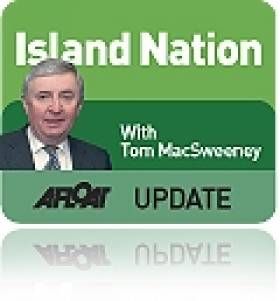Displaying items by tag: Tir na nÓg
Do Boats Talk?
#islandnation – I have told my wife that my boat is not an inanimate object, that it does talk to me, which has generated the response that it costs enough, but does it ever explain why?
It may not be capable of vocal expression in terms of the delivery of a voice message, I have responded, but it certainly has an audio capability and a 'feel' to it, which lets me know when she (referring to my boat again) is unhappy with her situation, or the demands which I am making upon her.
When advancing this view to my wife in discussion, it has had less than a positive response and other people, perhaps not of a maritime vintage, do not accept my view that boats can talk, but I remain convinced that boats can and do talk in a particular manner. In the current edition of THIS ISLAND NATION which you can hear here, I am in discussion with Sean Walsh, President of the Old Gaffers' Association, about the love of boats and he tells me that he would not part with his beloved gaffer, Tir na nÓg of Howth.
"I sailed on a gaffer and I found the experience so extraordinary when I sailed on it for eleven years and then bought it and have sailed it for 22 years. My boat is a Falmouth Oyster and she is magnificent. These old gaffers were built for working fishermen and they fulfilled that brief perfectly in the same way as the Galway hookers fulfilled their brief," Sean told me when I interviewed him at one of those great locations for gatherings of the old gaffer, the Poolbeg Yacht and Boat Club in Ringsend, one of the great maritime locations of Dublin..
"Their sea kindliness, their ability, their composure in bad weather and a bad sea is, I found, totally extraordinary and I had never experienced anything like it and they look so bewitchingly beautiful in their full rig with a topsail and mainsail and I was bewitched when I first sailed on an old gaffer and I still am.
"I have been sailing Tir na nÓg of Howth for 22 years now and can never see myself sailing another boat."
There speaks a man who loves his boat.
Ah, if only old boats could talk, but there are sailors and owners, myself included, who believe that boats are not totally inanimate objects, but have a life and can, in their own way, talk to you at sea, letting you know how they feel as they cope with conditions.
What do you think – do boats talk?
John Hollahan accompanies the interview, singing 'If old Boats Could Talk'...
but perhaps they do, at least to some people..... me included.
The song is from the CD 'Songs for The River Men' which was compiled by the local community along the Suir Estuary when the three Bolger brothers, Paul, Kenny and Shane from Passage East in Co Waterford died after their 19ft fishing boat capsized outside Tramore Bay in June of last year. Paul, 49, was a father-of-one, his 44-year-old brother Shane had two young children and their 47-year-old brother Kenny was a single man.
On the programme you can also hear why tyres from a factory which closed down over 30 years ago are arriving on East Cork beaches and why the first-ever Christmas sea swim for charity, which started the tradition, will not be held this year.
The theme tune of THIS ISLAND NATION is 'Sailing By,' with which I led my maritime programme, SEASCAPES, on RTE for over 20 years. Now it sails on new airwaves. I hope you enjoy the programme.
Fair sailing
























































